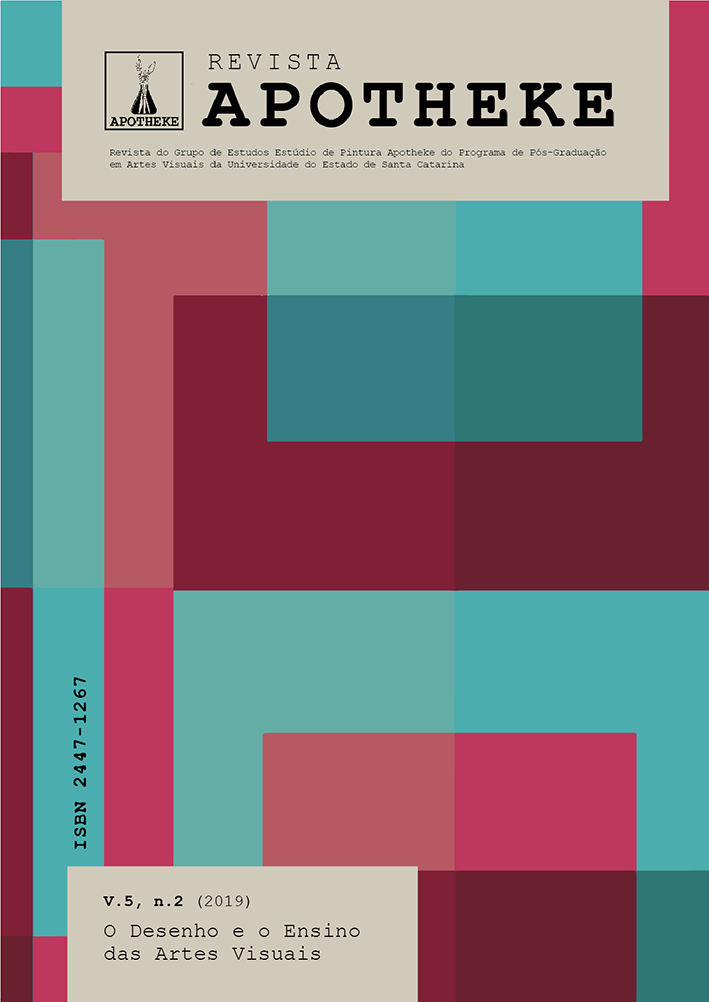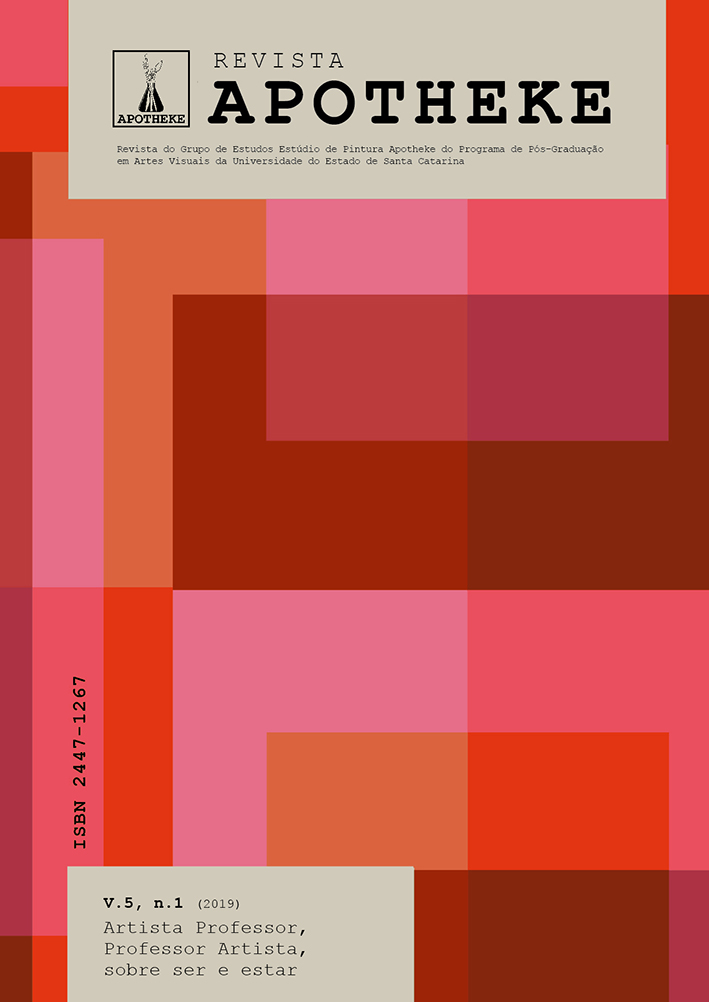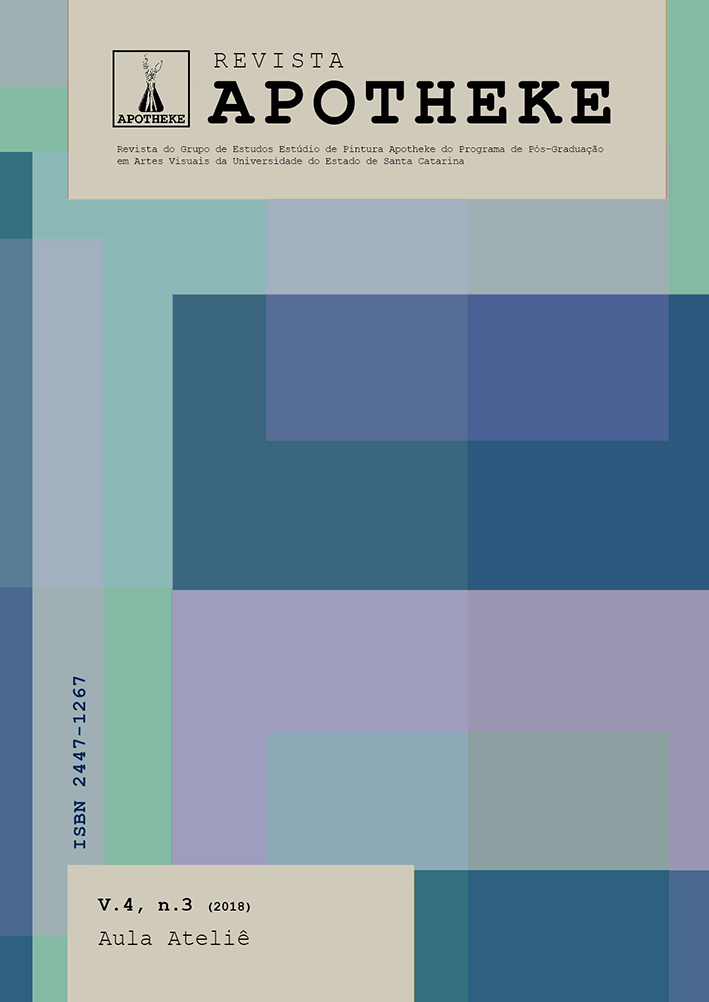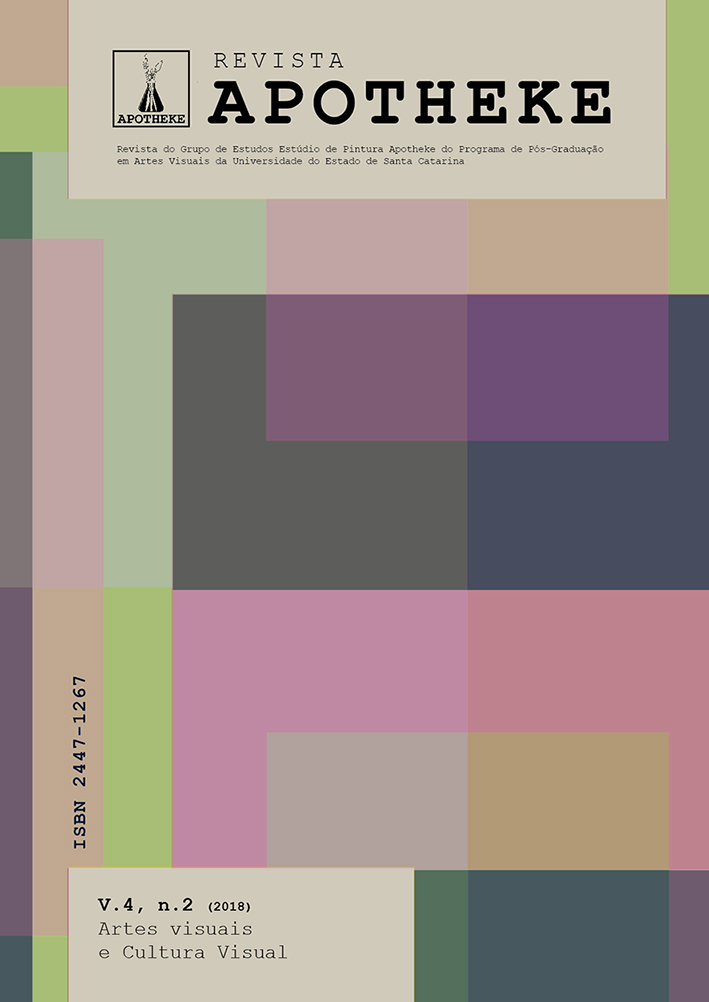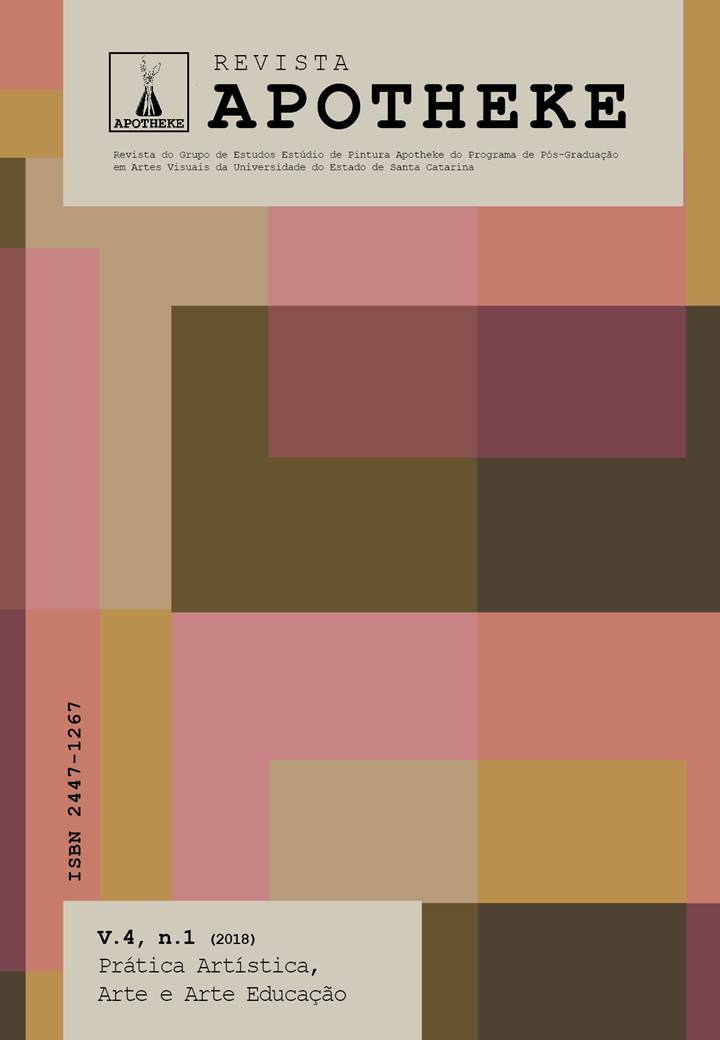Archivos
-
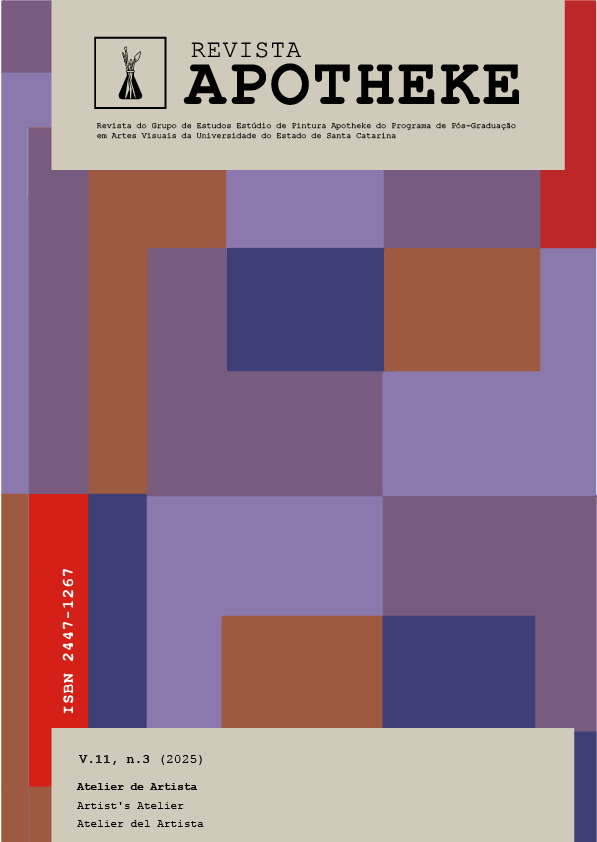
Atelier del Artista
Vol. 11 Núm. 3 (2025)Este tema, «Atelier de Artista», surgió a finales de 2024 en el marco de las reuniones periódicas del grupo de investigación interinstitucional Estudios Cromáticos. Desde las primeras reflexiones, el tema se mostró amplio, interdisciplinario y fecundo para la investigación. Estas características fueron determinantes para la orientación de este Dossier de la Revista Apotheke. Su alcance, como puede observarse en la recopilación de textos aquí presentados, abarca la praxis artística y sus transformaciones, los procedimientos educativos del arte en la actualidad y a lo largo de su historia, así como estrategias de sociabilidad específicas del circuito artístico.
El enfoque que pone el acento en el Atelier es necesariamente interdisciplinario. En él confluyen campos de investigación y teorías provenientes de los Procesos Artísticos, la Educación, la Historia, la Filosofía, la Sociología, la Antropología del Arte, entre otros. Es precisamente esta característica la que permite comprender el Atelier como un espacio múltiple de producción y creación, en el cual el entorno arquitectónico no constituye una norma ni se establece exclusivamente como un lugar de soledad. La recopilación de textos aquí presentada pone de manifiesto esta interdisciplinariedad de enfoques.
Se trata de un tema fecundo porque puede ser investigado desde diferentes perspectivas, que van desde estudios de caso del atelier de un artista específico, pasando por análisis comparativos orientados a la tipificación del atelier como lugar de creación, hasta aquellas aproximaciones que identifican en el atelier categorías analíticas capaces de, quizá, acuñar nuevas definiciones para proposiciones artísticas o sugerir caminos interpretativos. Esta diversidad de miradas sobre el atelier se encuentra presente en este Dossier.
-
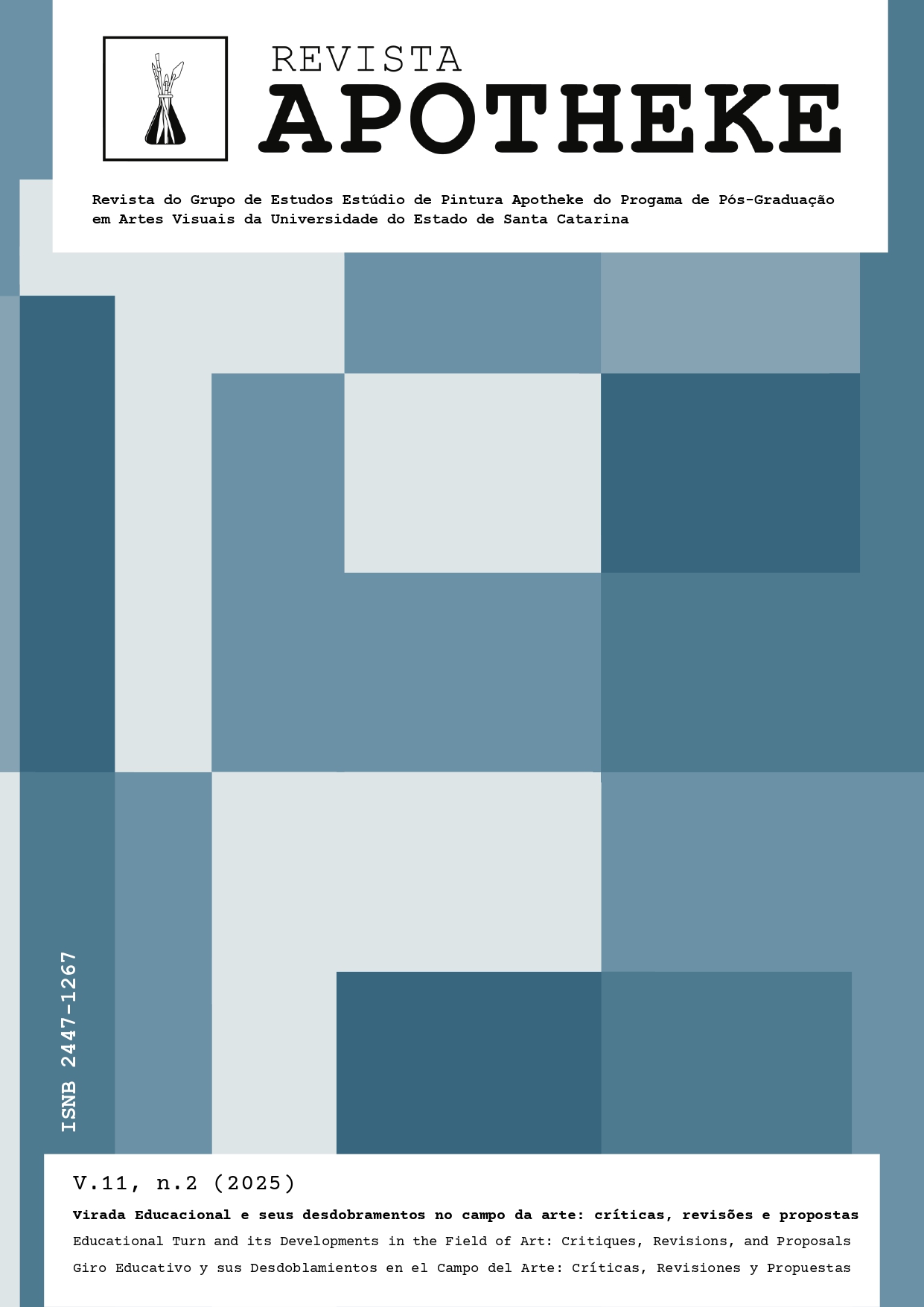
Giro Educativo y sus Desdoblamientos en el Campo del Arte: Críticas, Revisiones y Propuestas
Vol. 11 Núm. 2 (2025)La Revista Apotheke, periódico en línea de acceso abierto, presenta en este volumen artículos inéditos sobre la temática “Giro Educacional y sus desarrollos en el campo del arte: críticas, revisiones y propuestas.” Esta edición está dedicada a estudios y reflexiones sobre la educación estética y sus metodologías, abordando prácticas que circulan en el espacio de creación entre arte y vida, especialmente en el ámbito de las artes visuales.
Reflexionar sobre el Educational Turn significa reconocer la Educación como tema central y como praxis ampliada. En este contexto, la Educación se convierte en un espacio de debate y acción, en diálogo con el arte, problematizando dimensiones discursivas, políticas e institucionales. No se trata de adornar o reforzar prácticas ya establecidas, sino de tensionar las tendencias neoliberales que reducen la enseñanza a estándares, resultados inmediatos y cifras. Por el contrario, se busca comprender la creatividad como una fuerza transformadora, capaz de romper con las limitaciones de tiempo y espacio y de proponer nuevas percepciones y modos de actuación.
En esta edición, reunimos propuestas que exploran el cruce entre la producción artística y la intervención educativa, estimulando cuestionamientos y señalando nuevas formas de ver, hacer y entrelazar arte y educación.
-
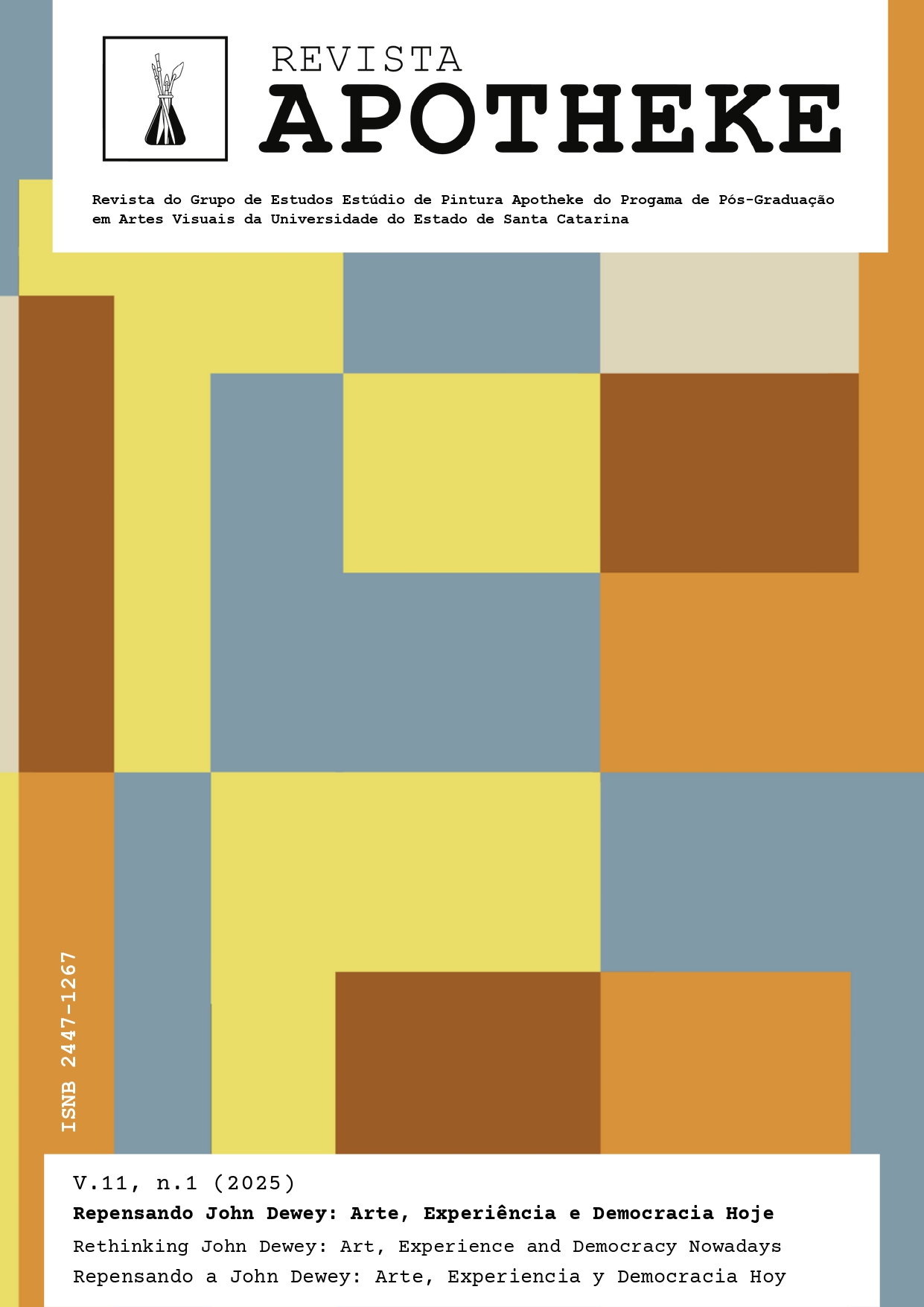
Repensando a John Dewey: Arte, Experiencia y Democracia Hoy
Vol. 11 Núm. 1 (2025)La Revista Apotheke, publicación en línea de acceso libre y universal, lanza una edición dedicada a artículos científicos inéditos sobre el tema “Repensando a John Dewey: Arte, Experiencia y Democracia Hoy.” La revista invitó a investigadores, docentes, artistas y estudiantes a participar de esta convocatoria, con el objetivo de revisar la obra de este filósofo y promover un espacio de reflexión y crítica.
En 2024 se cumplieron 90 años de la publicación de la obra estética más célebre de John Dewey, El arte como experiencia. Este libro no solo consolidó la tradición de la estética pragmatista, sino que también ayudó a posicionar, en el panorama histórico-filosófico, la tradición estética estadounidense en su conjunto. Se trata de una obra compleja y multifacética que abordó grandes conceptos de la filosofía del arte de su tiempo. Las reflexiones de Dewey en este libro han servido de inspiración desde entonces para públicos muy diversos: desde investigadores de la filosofía y las artes visuales hasta artistas, pedagogos y docentes. Gran parte de los artículos reunidos y presentados en este dossier dialogan con esta obra, señalando la continua actualidad del pensamiento filosófico de Dewey.
Este dossier está dirigido a lectores interesados en distintos aspectos de la filosofía de Dewey. Fue pensado tanto para servir como un primer acercamiento a quienes aún no conocen a este pensador, como para lectores habituales de su obra, que podrán encontrar aquí nuevos usos y perspectivas de sus conceptos e ideas. Así, tanto para quienes se inician como para quienes ya están familiarizados con su pensamiento, este volumen invita a continuar el diálogo con Dewey, explorando sus múltiples facetas y el poder transformador de sus ideas.
-
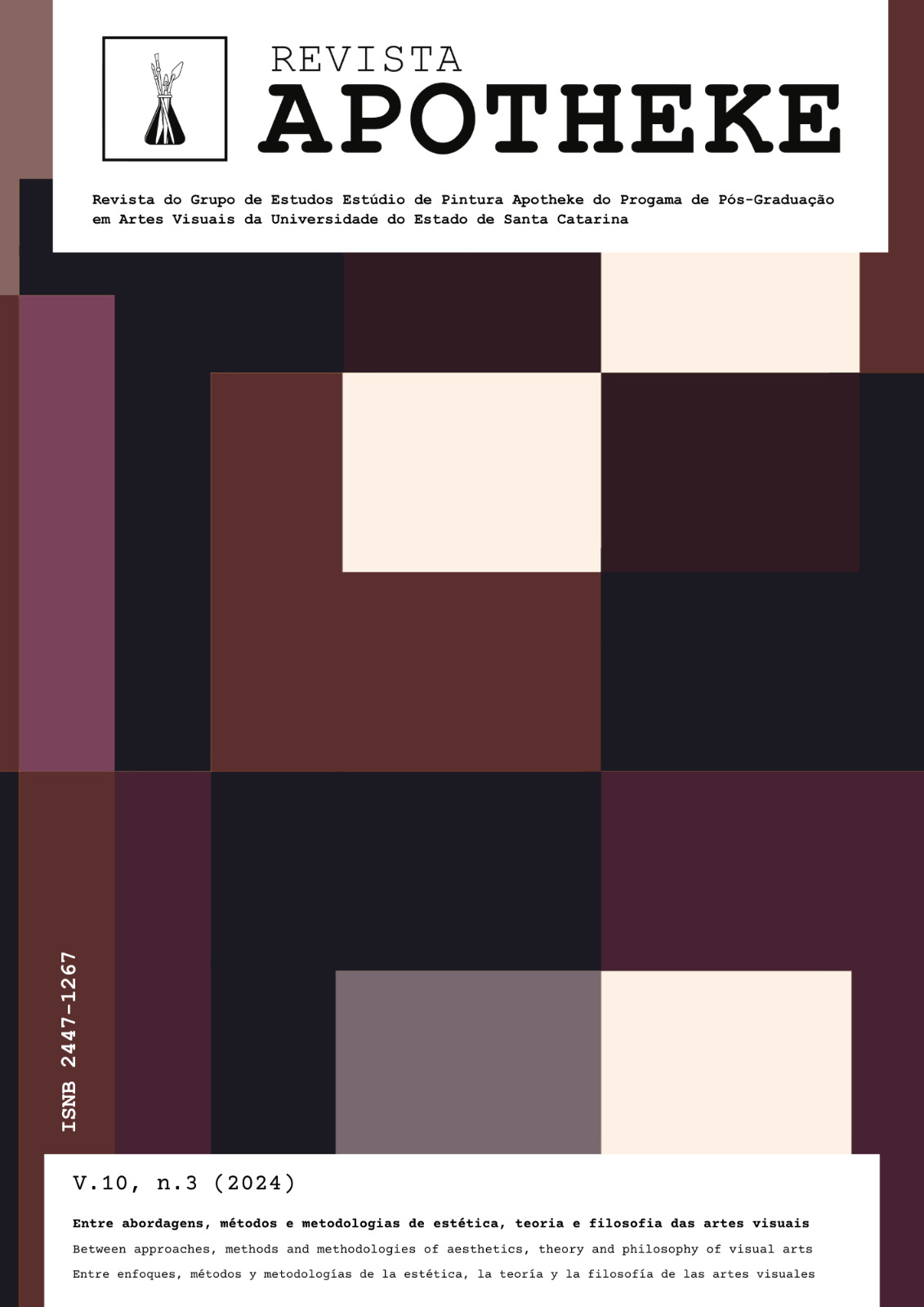
Entre enfoques, métodos y metodologías de la estética, la teoría y la filosofía de las artes visuales
Vol. 10 Núm. 3 (2024)La revista Apotheke recibió artículos científicos inéditos sobre el tema “Entre enfoques, métodos y metodologías en la estética, la teoría y la filosofía de las artes visuales”. Este número estuvo dedicado a estudios y reflexiones sobre la educación estética, sus métodos, metodologías y enfoques que circulan en el espacio de creación entre el arte y la vida, en cuanto a la producción en artes visuales.
Reflexionar “entre” medios, modos, formas, herramientas, conceptos, referencias, epistemologías y prácticas que orientan el pensamiento plástico (desde la concepción hasta la producción y recepción de la obra) también es parte de la formación de investigadores. Al mismo tiempo, el pensamiento plástico permite una perspectiva más amplia, ya sea en términos de la inserción histórica de la obra de arte, y la consecuente aprehensión de la temporalidad del ser humano, como sostiene Heidegger, o en términos del diseño de la obra individual. y la identidad colectiva a través de la producción y recepción de objetos artísticos. Por otra parte, la conexión entre objeto y discurso contribuirá a la ampliación de la experiencia estética, asumiendo ésta como el “material” de la propia creación artística, como se demuestra en varias de las prácticas artísticas experimentales desarrolladas a partir de la década de 1950.
En este contexto, se invitó a artistas e investigadores en artes visuales a participar en una convocatoria de artículos que tuvo como objetivo profundizar nuestra comprensión entre enfoques, métodos y metodologías en la estética, la teoría y la filosofía de las artes visuales. Buscamos contribuciones que resalten la importancia de compartir y deconstruir el proceso creativo, promoviendo un valioso intercambio de experiencias y perspectivas en el mundo del arte.
-
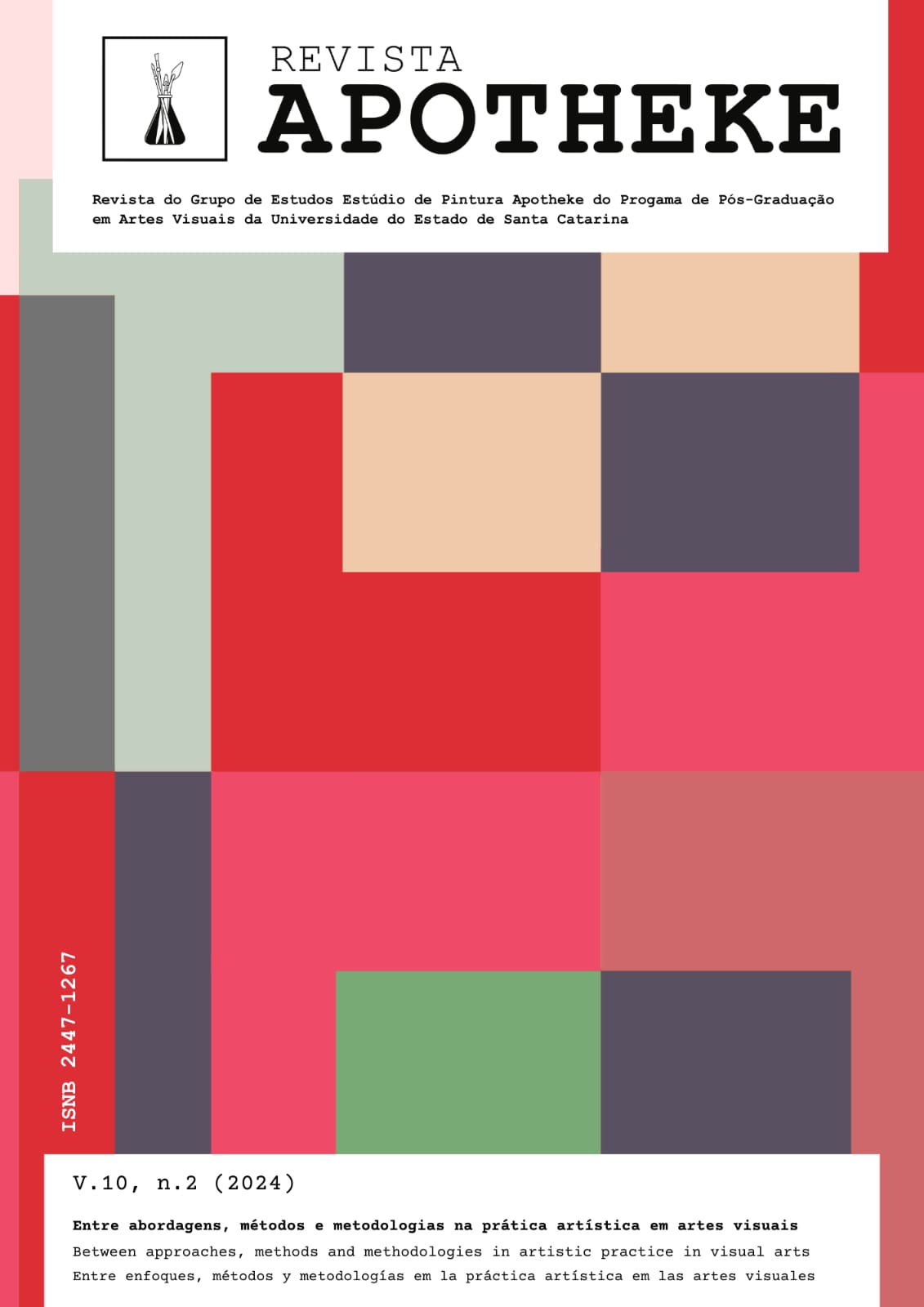
Entre enfoques, métodos y metodologías en la práctica artística en las artes visuales
Vol. 10 Núm. 2 (2024)La Revista Apotheke, revista en línea de acceso gratuito y universal, recibió artículos científicos inéditos sobre el tema “Entre enfoques, métodos y metodologías en la práctica artística en las artes visuales”. Este número estuvo dedicado a estudios y reflexiones sobre la práctica artística, sus métodos, metodologías y enfoques que circulan en el espacio de creación entre el arte y la vida, en términos de producción en las artes visuales. Reflexionar “entre” medios, modos, formas, herramientas, conceptos, referentes, epistemologías y prácticas que guían el pensamiento plástico (desde la concepción, hasta la producción y recepción de la obra), también forma parte de la formación del artista.
Artistas e investigadores en artes visuales fueron invitados a participar en una convocatoria de artículos cuyo objetivo era profundizar nuestra comprensión de los enfoques, métodos y metodologías que sustentan la práctica artística contemporánea. Buscamos contribuciones que resalten la importancia de compartir y deconstruir el proceso creativo, promoviendo un valioso intercambio de experiencias y perspectivas en el mundo del arte.
Comprender los enfoques innovadores, los métodos experimentales y las metodologías atractivas que impulsan la producción artística es de crucial importancia. Por lo tanto, alentamos a los artistas a compartir sus propios enfoques, explorando los territorios de creatividad, técnicas e investigaciones que han llevado a las obras que definen su práctica. Asimismo, fomentamos el análisis de las obras de otros artistas, destacando las contribuciones únicas que estos enfoques artísticos aportan al mundo de las artes visuales. Esta convocatoria de ponencias ofrece la oportunidad de profundizar en la diversidad de prácticas artísticas a escala global, al tiempo que inspira nuevas conexiones y diálogos entre artistas contemporáneos.
Esperamos que esta edición de Revista Apotheke contribuya significativamente al campo de las artes visuales, estimulando nuevas reflexiones y prácticas artísticas innovadoras.
-
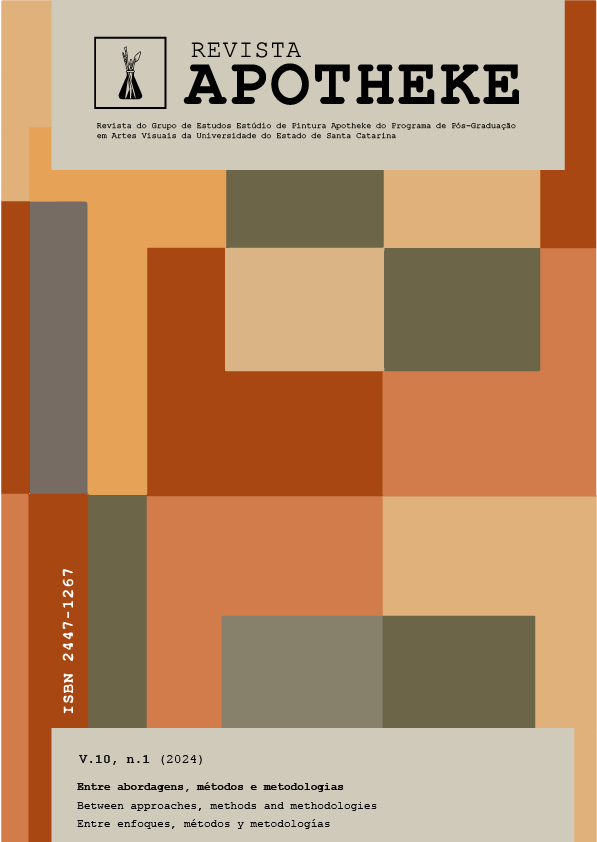
Entre enfoques, métodos y metodologías
Vol. 10 Núm. 1 (2024)El expediente temático "entre enfoques, métodos y metodologías" representa una iniciativa significativa en el campo de las artes visuales y el arte/educación, con el objetivo de presentar la diversidad de prácticas, teorías y estrategias pedagógicas que caracterizan esta área multidisciplinaria. Al convocar una amplia gama de contribuciones de maestros, artistas, investigadores y profesionales, el expediente busca no solo mapear el estado actual del conocimiento y la práctica artística, sino también para fomentar un diálogo profundo sobre cómo los diferentes enfoques pueden complementar, desafiar y expandir esos educativos y horizontes creativos. Este esfuerzo de colaboración es esencial para comprender la complejidad y la dinámica de las artes visuales y el arte/educación, enfatizando la importancia de una reflexión constante sobre los métodos y metodologías desarrollados tanto en la creación como en la enseñanza de arte.
Además, el expediente tiene el potencial de servir como una brújula para los maestros de los investigadores artísticos, ofreciendo perspectivas que pueden alimentar la enseñanza y la práctica artística o la práctica artística-senior. Al destacar la intersección entre la teoría y la práctica, y entre diferentes formas de pensar y hacer arte "entre enfoques, métodos y metodologías" fomenta un enfoque pedagógico que es reflexivo e inventivo. La inclusión de una variedad de voces y experiencias contribuye a la construcción de un campo más inclusivo y diverso, donde la enseñanza de las artes visuales se considera un proceso dinámico y adaptativo, capaz de responder a los cambios culturales, sociales y tecnológicos que influyen tanto. Educación sobre la práctica artística contemporánea.
Por lo tanto, la revista Apotheke, con su llamada provocó maestros, artistas, investigadores, académicos y profesionales dedicados a las artes visuales para participar activamente en la elaboración del expediente, buscando un diálogo sobre las múltiples facetas que impregnan el vasto campo de las artes visuales en la articulación. con arte/educación. -
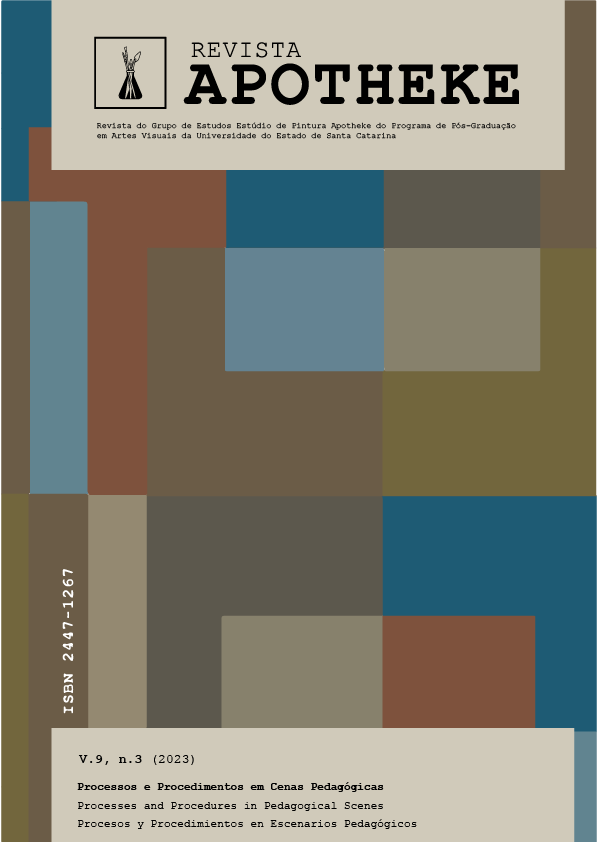
Procesos y Procedimientos en Escenarios Pedagógicos
Vol. 9 Núm. 3 (2023)Con la redacción de un dossier sobre "Procesos y Procedimientos en Escenas Pedagógicas" se buscó develar un camino de investigación para la enseñanza. El desafío persiste en la relación entre teoría y práctica, que debe ser percibida y practicada de manera integrada, evitando la adopción de momentos aislados de práctica o teoría. Más bien, buscamos crear una unidad para los componentes curriculares, uniendo prácticas que se configuran como acciones integradas de enseñanza, investigación y extensión tanto en la Escuela como en la Universidad.
Este aspecto se evidencia en la elección de procesos y procedimientos que involucran investigación y despiertan la estética. Interacción y experiencia estética), el experimento, la vivencia, valoran el acontecimiento revelado y reflejado antes, durante y después. Los desafíos estéticos revelan proposiciones, opciones metodológicas para provocar acciones y reflexiones, siempre insertas en las prácticas sociales, subordinadas al contexto singular, atentas a quienes participan en él, conducen a reflexiones sobre ambientes provocativos, talleres, clínicas, laboratorios, propuestas artísticas y performances. .
En este contexto, observar, mapear, analizar, reflexionar y, sobre todo, crear son acciones que orientan y reúnen la teoría y la práctica, el tema del tema, los medios de los métodos, las valoraciones de las continuidades y el contenido de la forma. ¿Cómo planificamos nuestras clases? ¿Cómo decidimos qué presentar a nuestros estudiantes? ¿Cómo logramos componer dentro del contexto en el que estamos insertos? O, finalmente, ¿cómo nos desafiamos a nosotros mismos? Es evidente la importancia de documentar nuestras acciones, proyectos y enfoques, como condición fundamental para la investigación, abarcando desde nuestras inquietudes, problemas, métodos hasta nuestros anhelos.
Estas preguntas están presentes en este volumen de la Revista Apotheke, que se complace en presentar una selección de 18 trabajos que abarcan diferentes modalidades, con artículos dedicados al tema central "Procesos y Procedimientos en Escenas Pedagógicas", entrevistas, ensayos visuales y artículos en continua demanda. . Cada contribución refleja el compromiso y la diversidad de perspectivas de los autores, aportando diversos matices sobre temas contemporáneos presentes en el campo del Arte/Educación articulados con prácticas/escenas pedagógicas. Este conjunto de obras pretende enriquecer el diálogo académico, estimulando reflexiones sobre los procesos y procedimientos que configuran el escenario pedagógico contemporáneo.
-
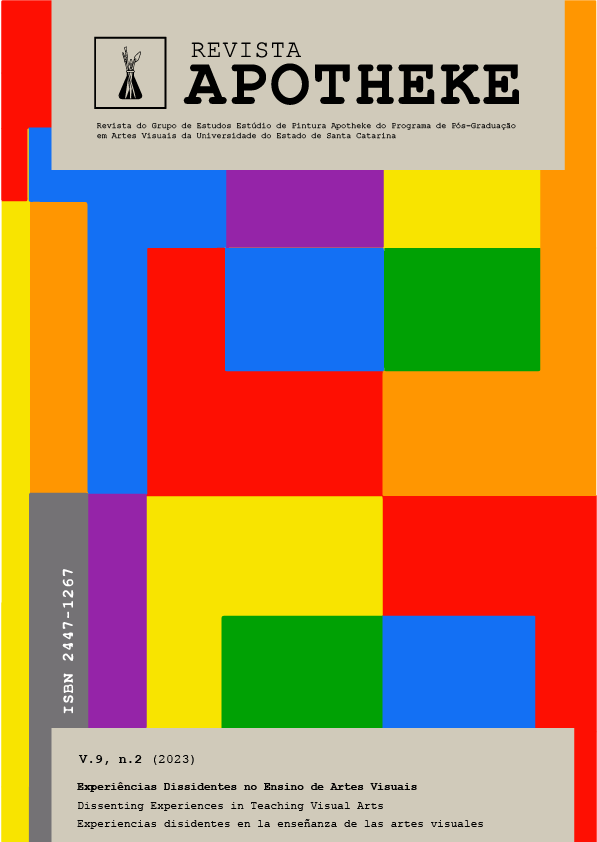
Experiencias disidentes en la enseñanza de las artes visuales
Vol. 9 Núm. 2 (2023)Con gran entusiasmo y dedicación presentamos la más reciente edición de la Revista Apotheke, titulada “Experiencias disidentes en la enseñanza de las artes visuales”. Esta edición saca a la luz experiencias docentes en artes visuales que, de manera inventiva, crean otras formas de reinventar el mundo y nuestros conocimientos. En línea con los escritos de Ailton Krenak (2022), entendemos el Arte como una posibilidad para construir futuros posibles. ¿Pero qué futuros serían esos? Estos son futuros donde las personas y la naturaleza coexisten sin la importancia de que una se apodere de la otra, futuros donde la educación no da forma, sino que fortalece y mejora la vida en toda su diversidad. Son, sobre todo, futuros donde se fomenta la imaginación. Además, en esta edición se plantean las voces (ganchos, 2019) de docentes, estudiantes, artistas e investigadores que desafían los límites convencionales de la enseñanza de las artes visuales. Sus experiencias y perspectivas potencian el debate sobre cómo el arte puede construir caminos para pensar las cuestiones sociales de una manera crítica-reflexiva. Vale resaltar que el término “disidencia” se entiende en su forma poética, pues trasciende los límites de definiciones estrictas. Nos invita a investigar los márgenes, matices y diversas manifestaciones de la subjetividad, la expresión artística y la resistencia cultural. En las páginas de esta edición encontramos una invitación a celebrar la diversidad, valorar las voces menos escuchadas y apreciar la singularidad en medio de múltiples universos.
Fábio Wosniak (UNIFAP)
Jociele Lampert (UDESC)
Organizadores de volumen
-
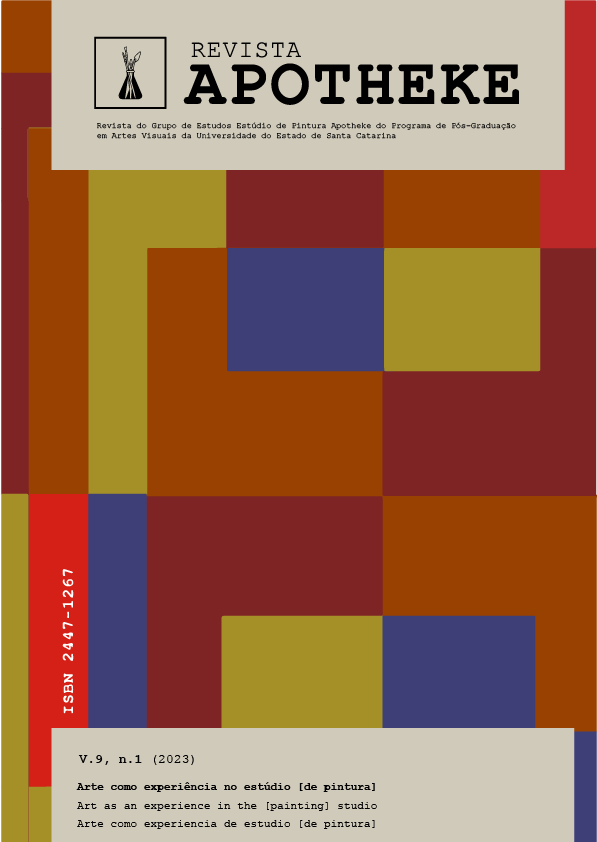
Arte como experiencia de estudio [de pintura]
Vol. 9 Núm. 1 (2023)Revista Apotheke received scientific articles on the theme “Art as an experience not a study [of painting]”. This number is dedicated to studies and reflections on artistic practice and pedagogical practice that circulate in the space of creation, as this space and time imply vibrant limits between Art & Education & Life. Olha-se stops the study as a space, time and place, where processes of upbringing are consolidated and built, in front of the use of artistic methodologies, to think about the classroom spaces that we use the artistic as a methodology to address content that transits between discursive spheres , political and educational. At the same time, the space, time and place of pedagogical practice are understood as artistic practice, permeated with critical reflection, a condition to establish a visual thought against Education and its plasticity.
-
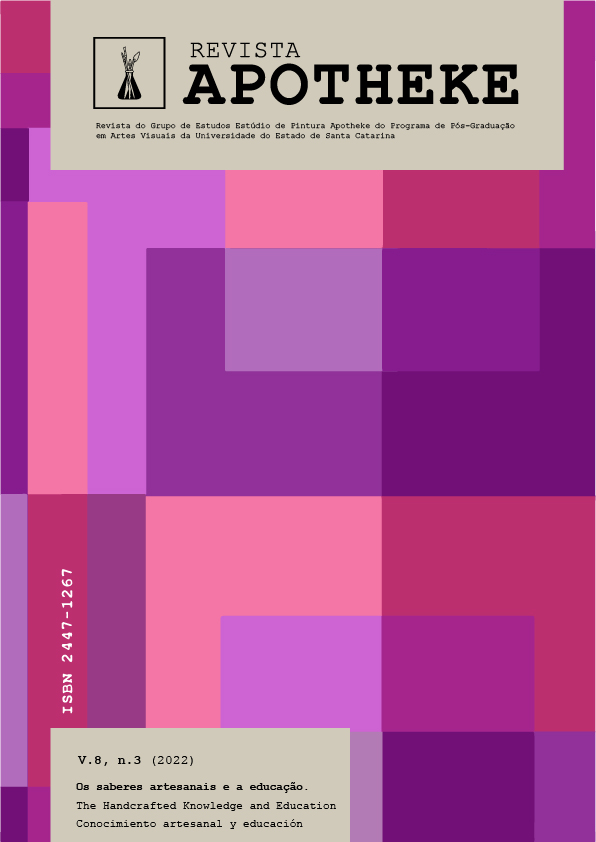
Conocimiento artesanal y educación
Vol. 8 Núm. 3 (2022)En el dossier “El saber y la educación artesanal”, presentamos trabajos surgidos de investigaciones que abordaron las siguientes provocaciones: ¿cuáles son las posibilidades artísticas, inventivas y educativas que convocan las prácticas y saberes artesanales cuando se ponen en diálogo en las clases de arte? ¿Cómo articulan artistas y docentes saberes, sentimientos y oficios en sus poéticas artísticas y también pedagógicas? ¿Cómo hacer visibles las tensiones, tanto en la práctica como discursivamente, en la relación entre arte y artesanía? ¿Y en qué medida estos debates son más densos en el contexto escolar en general?
Como una forma de problematizar aquellas prácticas generalmente relegadas dentro y fuera del contexto académico, en detrimento de la monopolización del saber que deja de lado la importancia del hacer y del sentir, los textos de este dossier nos invitan a pensar juntos sobre estas cuestiones. Se abre así un camino para generar debate, reflexión y puesta en común de experiencias en relación al quehacer artístico que abraza el trabajo artesanal; en torno a prácticas educativas que dialogan con otros saberes y acortan las distancias entre hacer, sentir y pensar. -
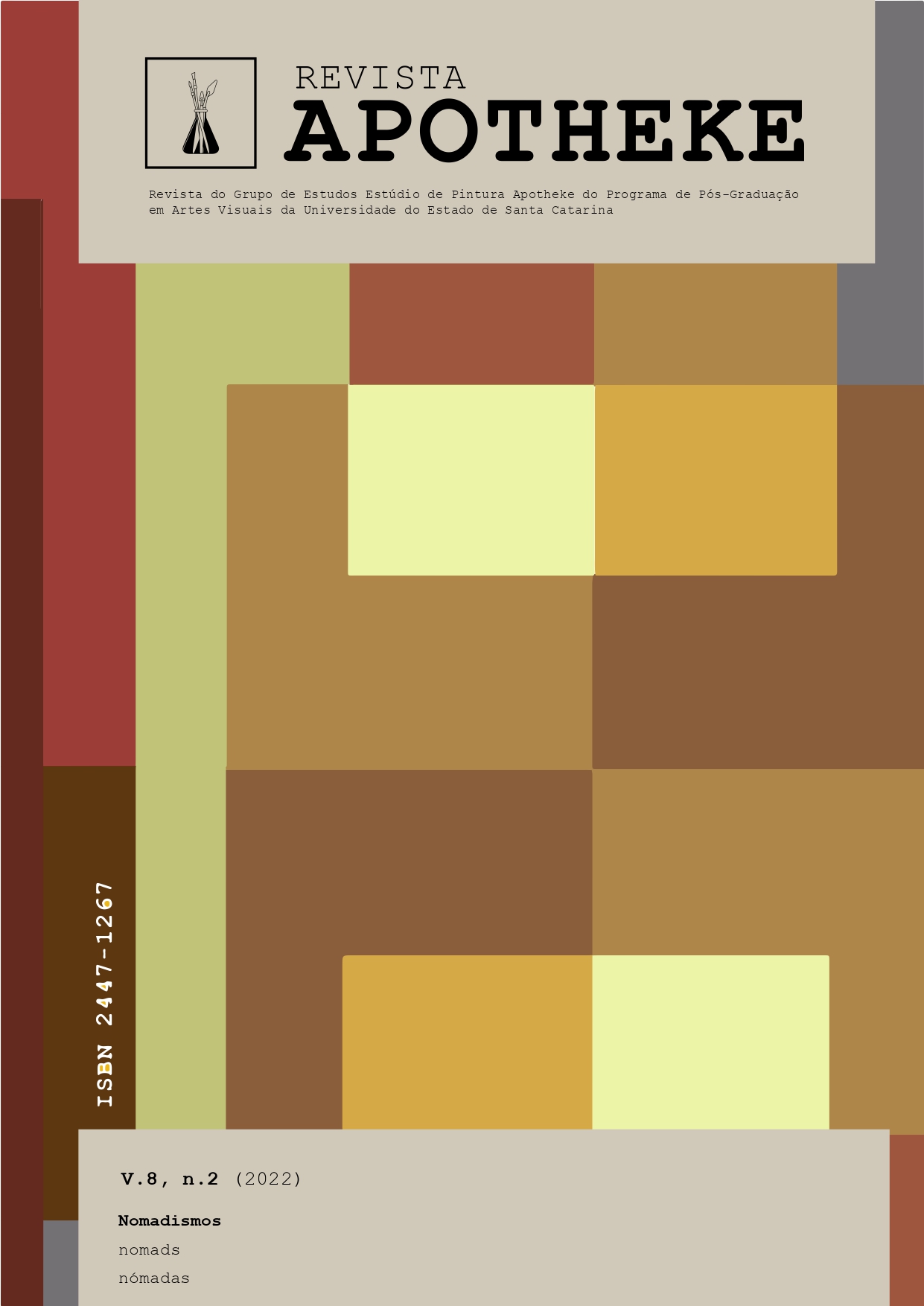
nómadas
Vol. 8 Núm. 2 (2022)Aline Nunes (UFRGS) Angélica D’Avila Tasquetto (UFSC) Organizadoras de VolumenEste volumen, Revista Apotheke, propone reflexiones sobre nomadismos y dibujos cartográficos en torno al arte, la docencia, la investigación y la educación, en el sentido de ejercitar otras formas de abordar temas contemporáneos: pandemia, encierros, memorias, espacios educativos... y, en definitiva, como un derecho a pensar diferente de lo que pensamos. Con eso, lanzamos invitaciones para que otros investigadores se sintieran impulsados a compartir sus narrativas e investigaciones en torno al tema de los nomadismos y, a partir de eso, hoy elaboramos este hermoso y diverso dossier, con trece artículos y tres ensayos visuales, que nos señalan las múltiples direcciones a las que ha llegado nuestra propuesta inicial. A lo largo de este número, los lectores encontrarán artículos cercanos que nos hablan de cierto compromiso de asumirse en tránsito: ideas, posturas, acciones en espacios relacionados con el arte, la educación, la cultura visual, entre otros que también están presentes en estos escritos.
-
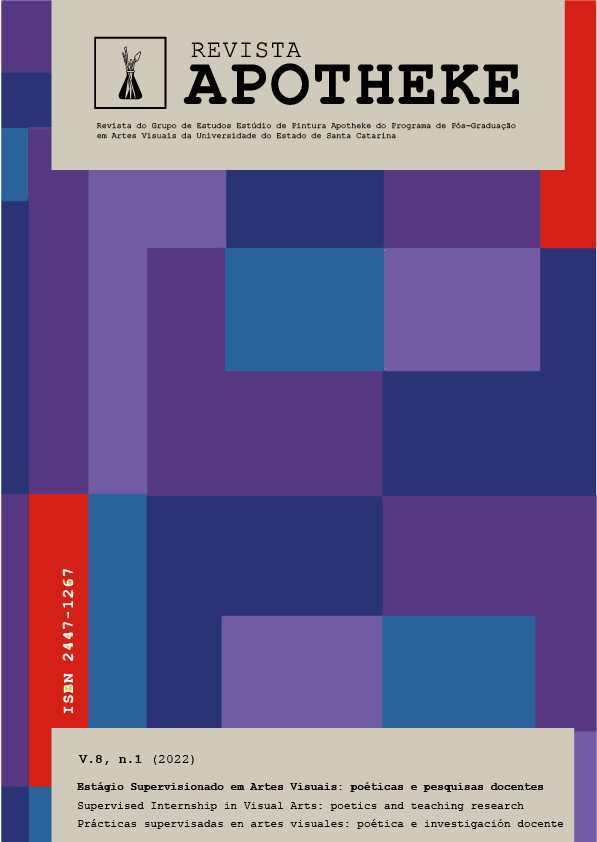
Prácticas supervisadas en artes visuales: poética e investigación docente
Vol. 8 Núm. 1 (2022)Fabio Wosniak (UNIFAP)
Tharciana Goulart da Silva (UDESC)
Organizadores de volumenDurante la formación en los cursos de Licenciatura en Artes Visuales, las prácticas curriculares supervisadas son momentos en los que se perfilan las primeras experiencias en el contexto de la práctica docente. Los estudiantes, con el apoyo del docente de la institución y del docente de la escuela, pasan sus primeros años en las unidades escolares. Este ejercicio, además de una búsqueda práctica o instrumental, es una oportunidad para desarrollar investigaciones sobre la propia formación, experimentar formas de ser docente y construir formas de pensar-hacer-pensar la investigación en artes visuales y didáctica.
La pasantía supervisada es un momento en que la acción y la reflexión van de la mano y pasan por una red de apoyo que se crea entre la universidad y la escuela. A través de esta red, el alumno de la pasantía tiene la oportunidad de desarrollar una enseñanza que refleje sus objetivos, que se ponga en diálogo con la realidad escolar encontrada y que enfrente los dilemas que rodean el contexto de la práctica. No hay estado, existe la posibilidad de iniciar la construcción de una subjetividad docente, asumiendo que no es fija ni objetiva.
Para la construcción de la subjetividad, entendemos que la Licenciatura en Artes Visuales traza en su especificidad un pensamiento poético, y consideramos también que es urgente que tal búsqueda atraviese las disciplinas escénicas. En otras palabras, es necesario que el sentido poético se ejercite y no se descuide en la construcción educativa; y que, de esta forma, el internado se pueda desarrollar con una potencia que se encuadre en el área de Artes Visuales.
La investigación pedagógica, en diálogo con el pensamiento poético artístico, plantea la cuestión de cómo se pueden crear propuestas de aula para brindar a los estudiantes experiencias únicas (DEWEY, 2010) sobre el arte y la vida o formas de percibir cómo se relacionan el arte y la enseñanza. Considerando que este debate es amplio y necesita ser explorado, presentamos el tema Pasantía Supervisada en Artes Visuales: poética e investigación docente para este volumen de la Revista Apotheke. Con esta organización buscamos dar a conocer las prácticas desarrolladas por profesores universitarios, maestros de escuela y estudiantes de pregrado; y también, profundizar en las diferentes perspectivas actuales que rodean esta relevante etapa de la formación inicial.https://doi.org/10.5965/24471267812022001
-
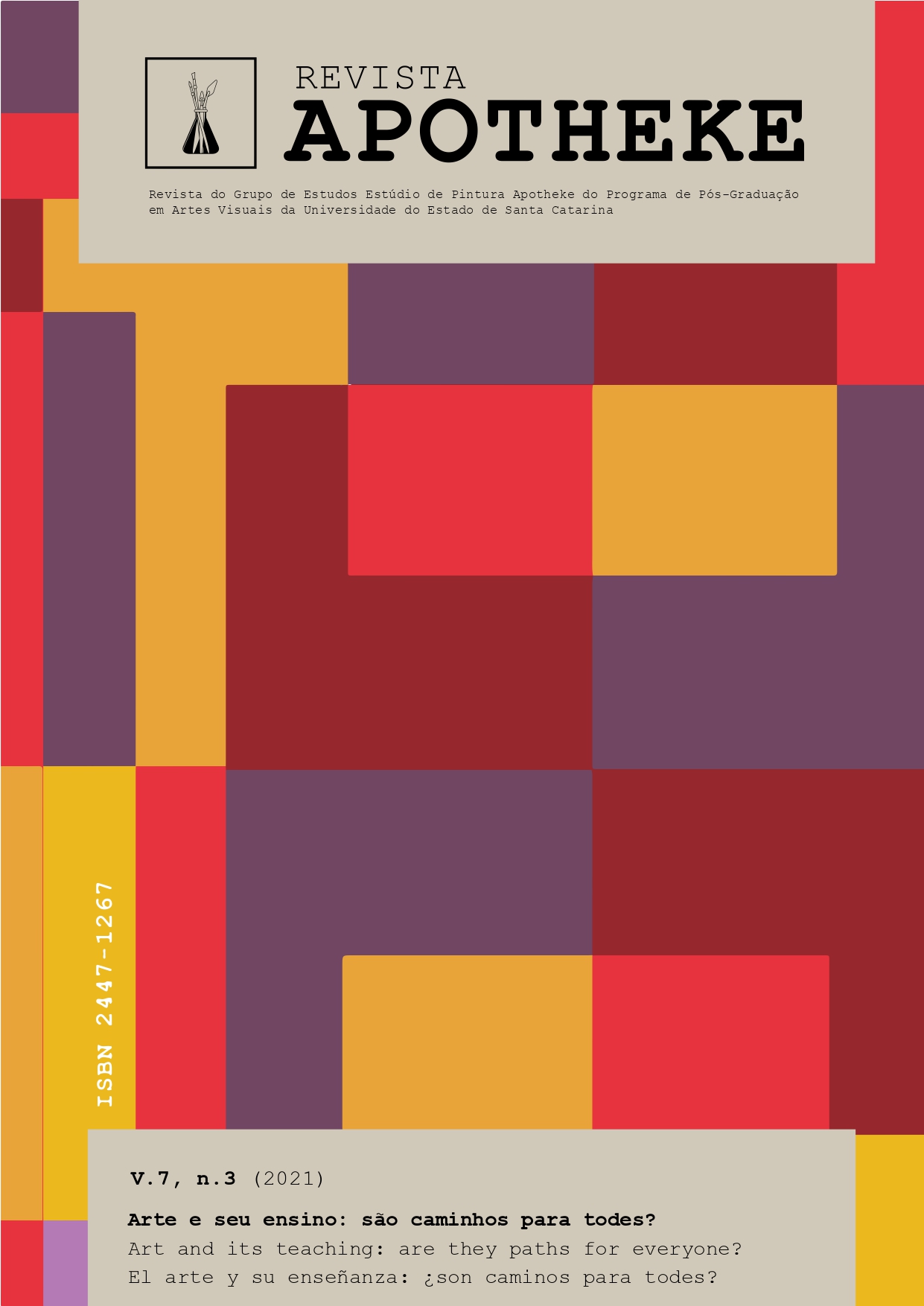
El arte y su enseñanza: ¿son caminos para todes?
Vol. 7 Núm. 3 (2021)En tiempos de pandemia de Covid19, las relaciones humanas se han vuelto extrañas, contaminantes, además de la enfermedad, los miedos, la violencia, el odio, el racismo, el machismo, los prejuicios de género, de color y la muerte. Estas relaciones se han vuelto tan increíbles que nos parecen inhumanas. Pero, son parte de lo humano, lo imaginario trae simbologías, imágenes buenas y malas. Y en la pandemia, estas máscaras sociales cayeron al suelo cuando tuvimos que vivir aislados y en contacto directo con las familias dentro de nuestras casas. Ya sea en casa o en la calle, la violencia prosperaba.
Para algunos, las armas lo resuelven todo; para nosotros, el amor y las relaciones afectivas nos desplazan de esos lugares de violencia. Y es en este contexto de amor que proponemos pensar en una edición de la Revista Apotheke centrada en temas de disidencia. La intención es destacar lo que tenemos de maravilloso entre las personas que suelen estar al margen de la sociedad y, por tanto, son invisibles. Es una forma de resistencia. Los negros, los indígenas, los gays, los no binarios, los mixtos, cualquiera que sea su aspecto, merecen ser respetados en sus diferencias. Estas personas, normalmente excluidas por ser diferentes, hacen arte y se expresan a través del arte. El arte es para todos. Y tenemos innumerables personas que hacen arte que no encajan en un estándar preestablecido en la sociedad patriarcal en la que vivimos. Sacar del olvido las narrativas que se oponen a las hegemónicas, dar luz a las historias de vidas disidentes. Pretendemos transformar estas narrativas e incluirlas en las clases de artes visuales, cada vez más. Estos artistas están repartidos por todo el mundo, más concretamente en Brasil, y tenemos que mostrarles y presentarles cómo su creación repercute en la vida que llevan, a menudo en lugares de ocultación social. En la enseñanza del arte, es urgente que tengamos una historia de inclusión y que estos artistas se hagan visibles en las lecturas de imágenes que se realizan en el aula. Es el deseo de un mundo más igualitario que acepte las contradicciones inherentes al ser humano, una sociedad democrática y con clases de arte que incluyan más artistas trans, negros, indígenas, multicolores, diferentes, es decir, cuerpos disidentes para una enseñanza del arte disidente.
-
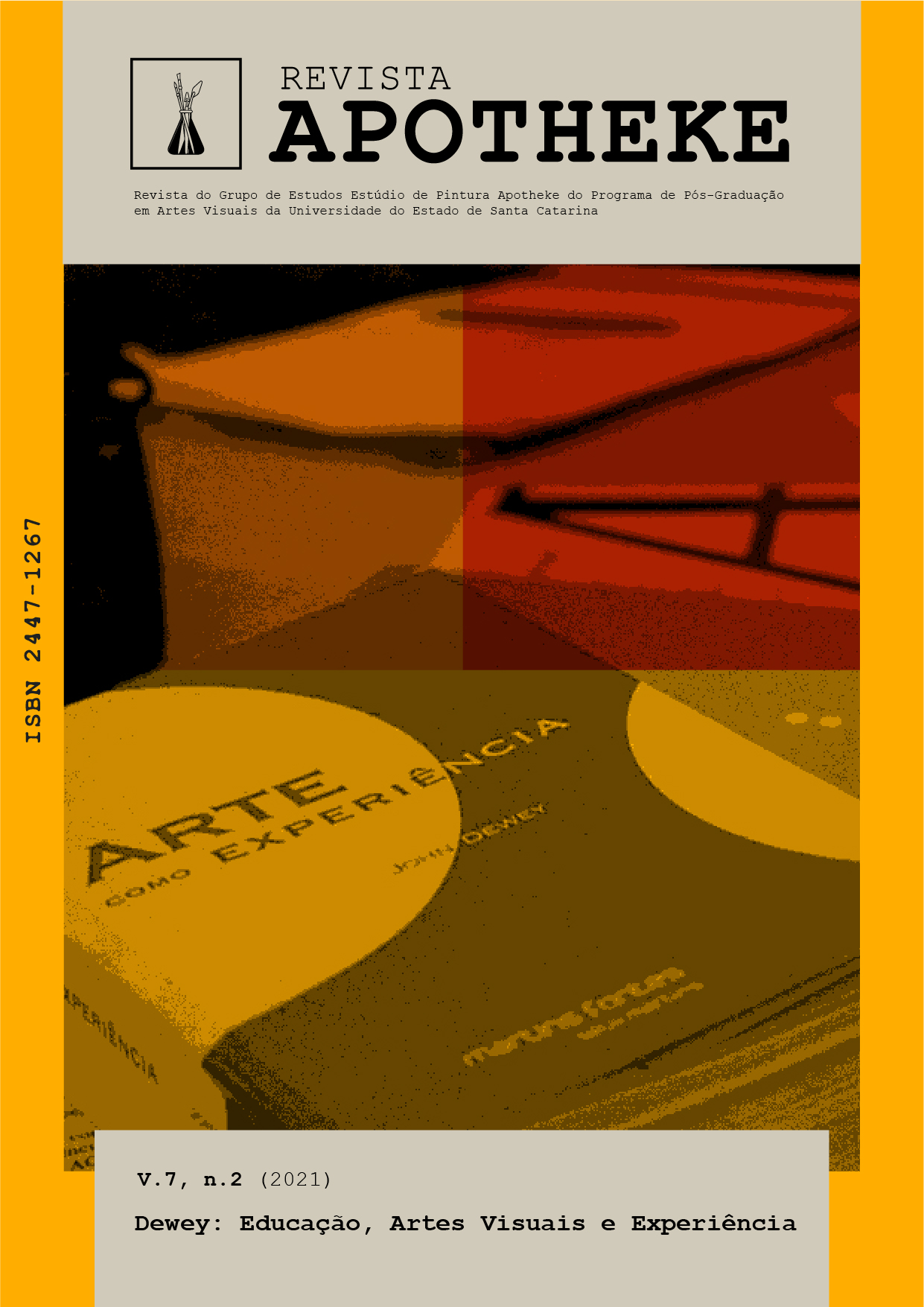
Dewey: Educación, Artes Visuales y Experiencia
Vol. 7 Núm. 2 (2021)La revista Apotheke aborda en este dossier las articulaciones entre Educación, Artes Visuales y Experiencia, considerando las contribuciones del filósofo americano John Dewey (1859-1952) al campo de las Artes, la Educación y la Educación Artística, que comprende la enseñanza de las artes visuales, así como las artes escénicas y la música. La teoría deweyana presentó y sigue presentando un nuevo proyecto filosófico para pensar en las condiciones y valores sociales que implican una idea de conocimiento cercana a las experiencias cotidianas de la vida, donde la mente y el cuerpo, la vida, el arte y la educación no son compartimentos, sino que forman parte de una unidad que compone la vida. Dewey nos invita a pensar en la unión de las cosas, teoría/práctica, arte/vida, educación/vida. Siguiendo esta premisa, el camino de la enseñanza y el aprendizaje, orientado a la reflexión crítica, el reto sería romper con la frontera que distingue la vida de otras cosas, es decir, recomponer esta asociación potenciaría el poder creativo de la experiencia de aprendizaje.
En este volumen de la revista Apotheke, invita a todos a "pensar" con Dewey, a aprender de su filosofía de la experiencia o experecialidade, en la que las cosas no están separadas de la vida. La idea del Dossier es buscar una actualización de los conceptos de Dewey, rompiendo con las fronteras y dicotomías, es una invitación a reapropiarse de los conceptos del filósofo, sin encontrar respuestas definitivas, pero estableciendo condiciones y posibilidades de investigación, donde el cambio y la creatividad están vivos.
-
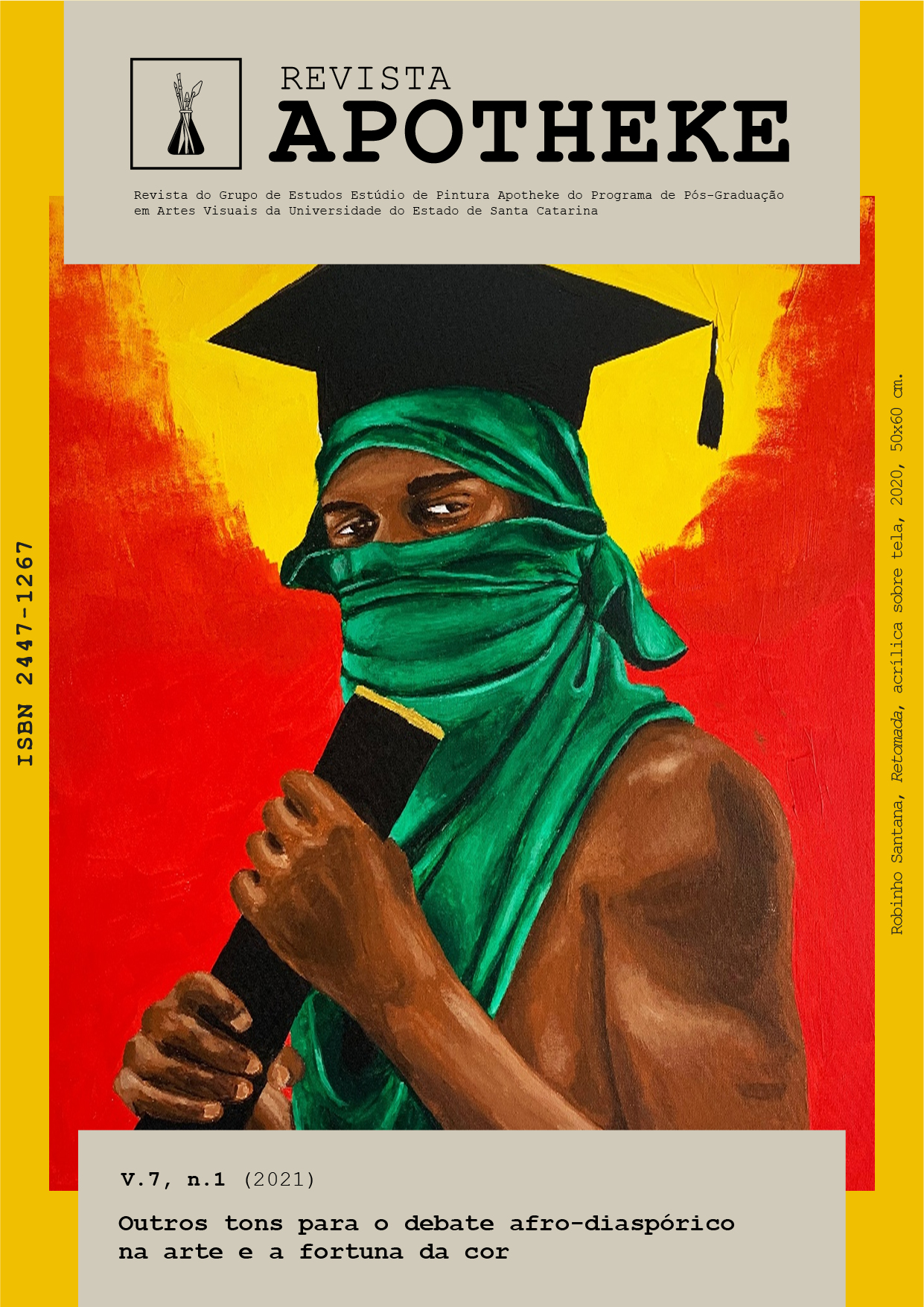
Otros tonos para el debate afro-diaspórico en el arte y la fortuna del color.
Vol. 7 Núm. 1 (2021)En este dossier, la revista Apotheke abordará el debate étnico-racial con respecto a los procesos de creación de arte; formación de la persona artista; de la construcción y narración de la historia del arte en Brasil, tal vez, en las Américas y en África con las artes visuales y, más específicamente, la pintura como puntos focales. Tenemos la intención de abordar esta expresión desde sus hitos históricos, como la vanguardia europea que subvierte la representación figurativa como devenir de la pintura, o el movimiento afroamericano de Harlem Renaissance, que en una dinámica opuesta apuesta por la figuración que representaba la realidad como instrumento de registro, de fortalecimiento y sedimentación de una historia del arte afroamericano. Sin embargo, más que analizar las producciones, las críticas, los escritos ya realizados, con la adición de que podemos abordarlos en una perspectiva revisionista, apuntamos a que este expediente prevea lo que puede ser el arte afro-diaspórico hoy y en el futuro cercano. . Pretendemos que las discusiones discutidas contribuyan a la proyección del futuro y otros entendimientos de la persona afro-diaspórica del grupo llamado negro o negro. Otras historias de artes visuales; Nuevas críticas para todos los tiempos; Imágenes de usted e imágenes de todos para posibles imaginarios ...
Otros tonos para el debate afro-diaspórico en el arte y la fortuna del color del legado afro-diaspórico en las artes visuales revisado y valorado como un impulsor de la creación de nuevos pensamientos y otras imágenes. Los pensamientos e imágenes que queremos y entendemos acerca de lo que somos y seremos.
-
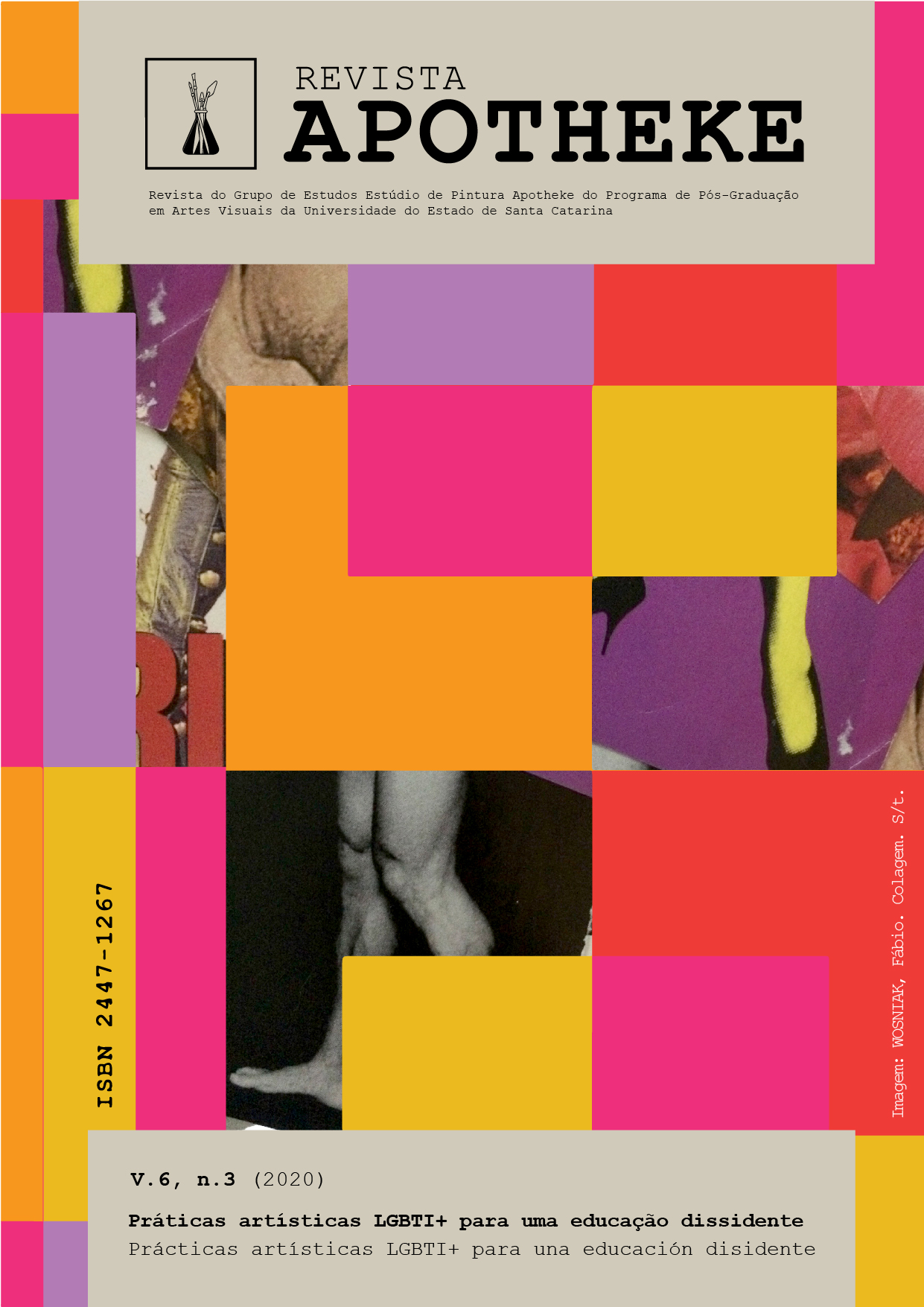
Práticas artísticas LGBTI+ para una educación disidente
Vol. 6 Núm. 3 (2020)Organizadores do volume
Fábio José Rodrigues da Costa
UNIVERSIDADE REGIONAL DO CARIRI – URCA - BRASILRicardo Huerta
UNIVERSITAT DE VALÈNCIA - UV - ESPANHA -
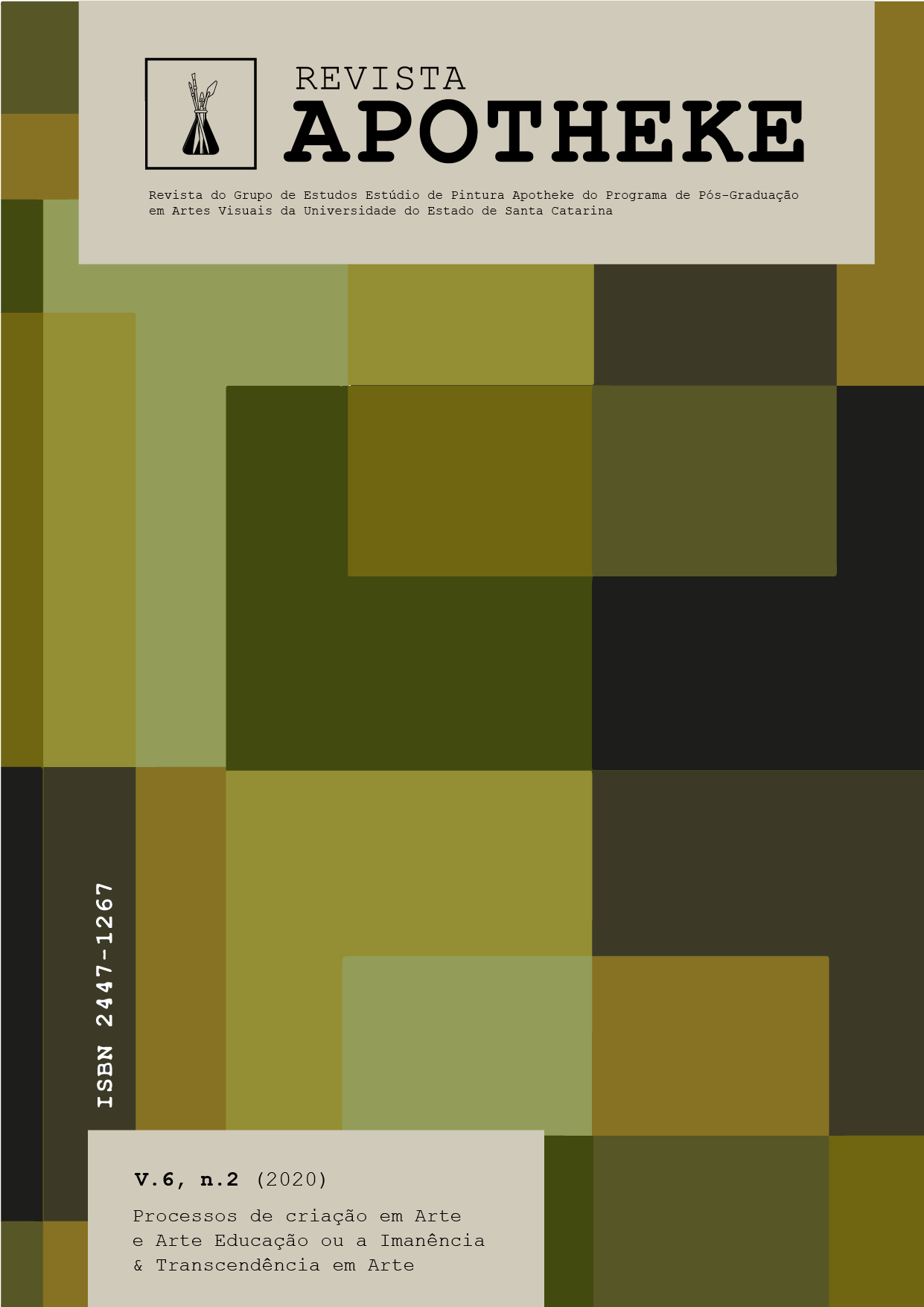
Processos de criação em Arte e Arte Educação ou a Imanência & Transcendência em Arte
Vol. 6 Núm. 2 (2020)Organizadora do Volume:
Marta Facco
-
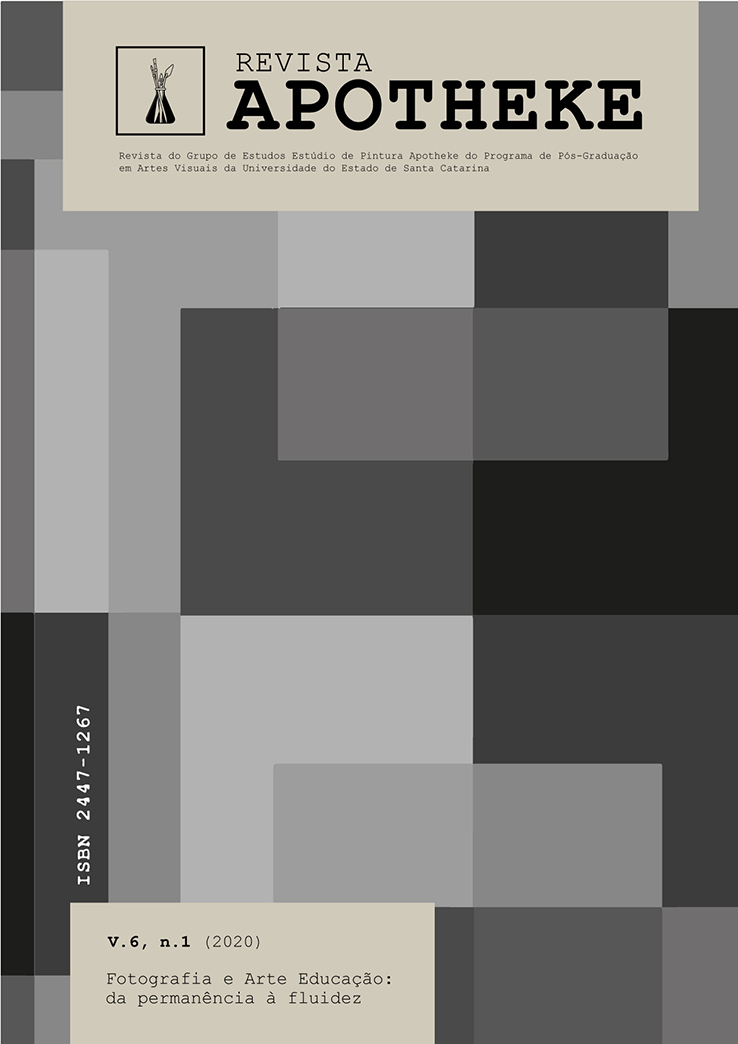
"Fotografia e Arte Educação: da permanência à fluidez"
Vol. 6 Núm. 1 (2020)A Revista Apotheke, em seu volume 6, número 1, aborda, como tema de seção "Fotografia e Arte Educação: da permanência à fluidez". Neste volume, o objetivo foi traçar discussões, a partir de processos fotográficos, sobre a docência em Artes Visuais e suas questões contemporâneas. -
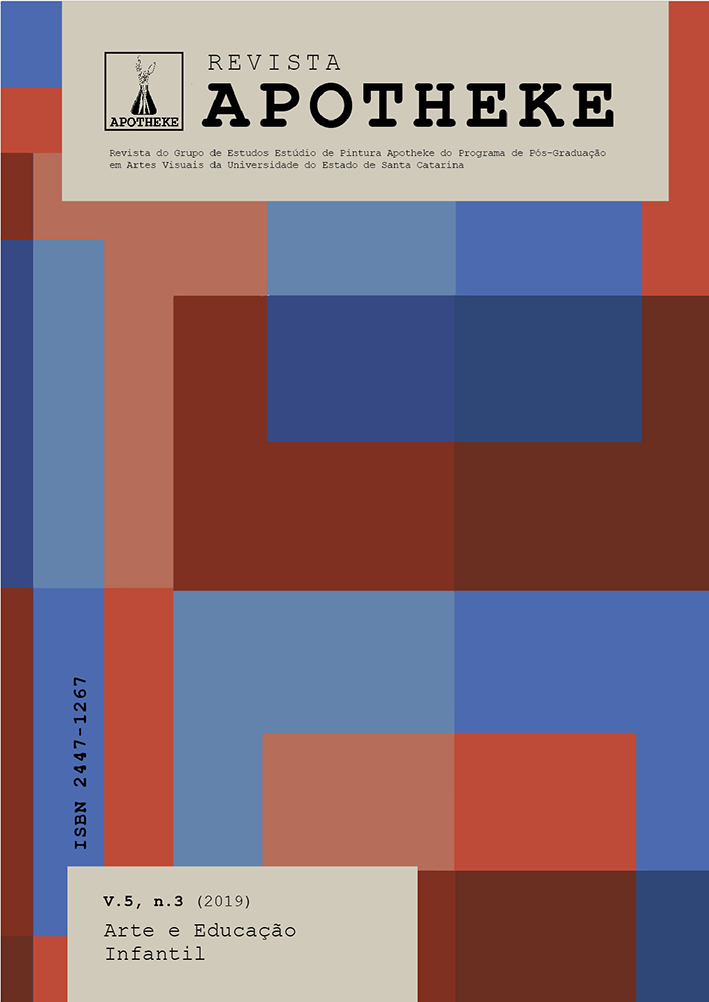
Arte e Educação Infantil
Vol. 5 Núm. 3 (2019)A Revista Apotheke é um periódico on-line de acesso livre e universal que, em seu 5º vol./nº 3, abre espaço para estudos e reflexões acerca do par "Artes Visuais e Educação Infantil”. Objetiva-se apresentar textos que relacionam e adensam o debate sobre a essencialidade da Arte na construção e/ou desenvolvimento do processo criativo das infâncias. Em meio a esta paisagem, anunciam-se assuntos que atravessam o campo da prática educativa e da prática artística, incidindo sobre as infâncias e formação do sujeito, gerando discussões relacionadas à relevância das Artes - conhecimento, entendimento e prática de suas linguagens - para a formação estética da primeira infância, bem como a construção de sua subjetividade e posicionamento crítico na sociedade e no mundo.
-
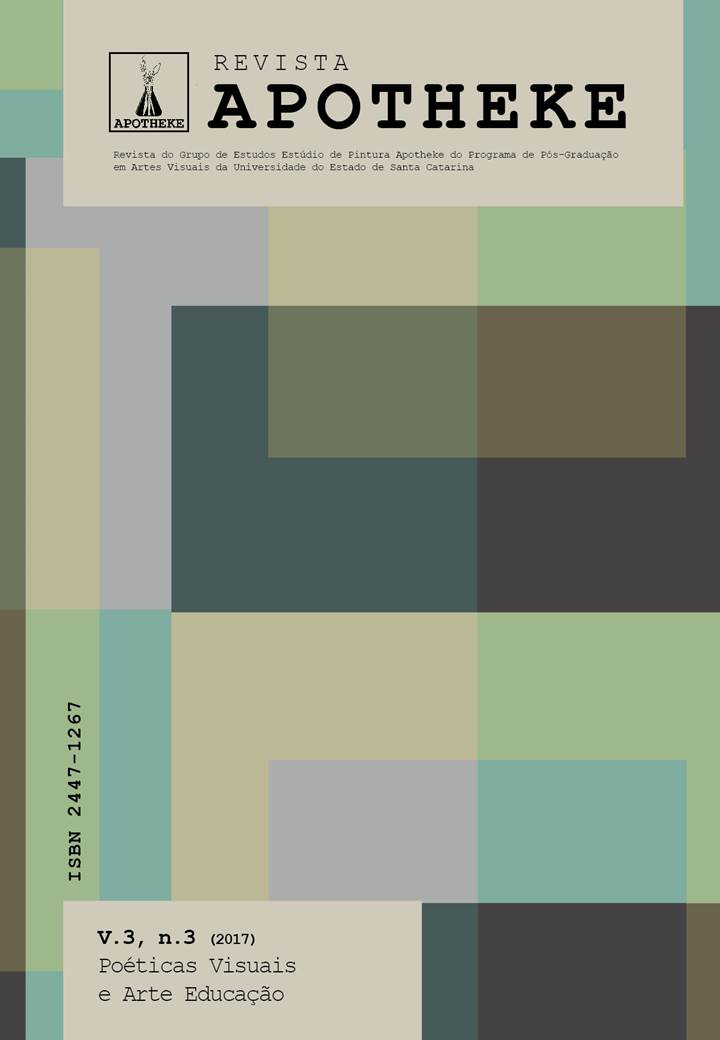
Poéticas Visuais e Arte Educação
Vol. 3 Núm. 3 (2017)A REVISTA APOTHEKE, em seu sétimo volume – “Poéticas Visuais e Arte Educação”, discute acerca da potência poética nos procedimentos pedagógicos, bem como, artísticos. Paira sobre a apresentação de temas como colagens e suas justaposições, pintura e desdobramentos para fotografia, e configura cartografias como territórios de práticas e reflexões sobre a Arte como Experiência.
Professora Dra. Jociele Lampert (Editora-Chefe)
Professor Doutorando Fábio Wosniak (Editor-Associado)

